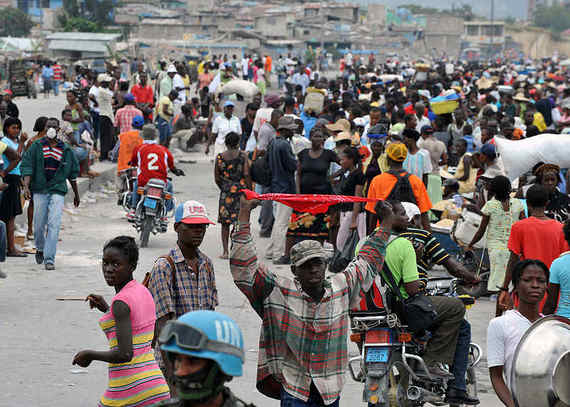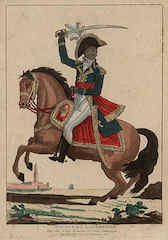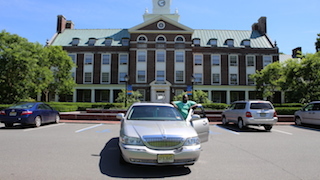"I was born a slave, but nature gave me the soul of a free man."
- François-Dominique Toussaint L'Ouverture
As one who believes passionately in the power of free markets, I believe that the welcome mat America offers to ambitious, hard-working immigrants has always been one of our greatest strengths as a nation. From French-born Iranian eBay founder Pierre Omidyar to Google's Russian-born Sergey Brin, many of America's successful entrepreneurs have been immigrants.
We hear a great deal about immigrants "taking" from the United States, but immigrants create nearly a third of all new businesses in the United States--more than twice the percentage created by the overall population. Business started by immigrants employ a tenth of the U.S. workforce. Immigrants are a vital source of entrepreneurial energy for a society.
Haiti in recent years (source)
When I moved to Princeton after having spent most of my adult life in New York City, I was very grateful for the welcome mat some hard-working, entrepreneurial immigrants I met in my new hometown extended to me.
Although I grew up in Flint, Michigan, home of General Motors, it's been decades since I've owned or driven a car. So, the minute I got to Princeton, I flagged down a taxicab. That's how I met Yves Jean Pierre and Jeunet Despeignes, two extraordinary entrepreneurs who emigrated to the U.S. from Haiti and have built a thriving taxi business in Princeton.
They were so friendly and upbeat that they instantly made me feel at home. When I told them I didn't know anyone in Princeton yet, they drove me around introducing me to people. They let me practice my rusty French on them and we talked for hours about Haiti's "Black Napoleon" François-Dominique Toussaint L'Ouverture--the military genius who successfully led the Haitian Revolution.
I have always greatly admired Toussaint L'Overture. He was ahead of his time in his commitment to freedom and equality, and his understanding of the importance of free markets and capitalism to a free society. Under his leadership, the African slaves who revolted against their French masters in August of 1791 toppled the French colony of Saint-Domingue. They eliminated slavery on their beautiful island and founded the first independent republic--The Republic of Haiti--on January 1, 1804.
Toussaint L'Overture improved the economy and security of the new country by negotiating trade treaties, and maintaining a large, well-disciplined army. Unfortunately, he was betrayed by a friend, arrested by Napoleon's forces and deported to France, where he died in prison. Toussaint L'Ouverture famously warned his captors:
In overthrowing me you have cut down in Saint Domingue only the trunk of the tree of liberty; it will spring up again from the roots, for they are many and they are deep.
Threatened by the impact the Haitian slave revolt might have on their own slave labor, the United States and Western Europe slapped punitive economic sanctions on Haiti, turning the prosperous colony into an impoverished state unable to sell the products of its fields. In addition, in 1852 France demanded that reparations of 90 million gold francs ($21.7 billion today) be made to former slave owners.
Haiti has yet to recover economically, and has had a rocky political history with both tyrannical dictator Jean-Claude "Baby Doc" Duvalier and the country's first democratically elected president Jean-Baptiste Aristide.
Toussaint L'Ouverture (source)
I sat down with Yves and Genet recently to talk about Haiti, America and entrepreneurship.
Although they disagree strongly on Aristide's legacy, they both agree that today Haiti is in good hands under current president Michel Martelly, who became president in 2011 after having been one of Haiti's most beloved popular musicians since the last 1980s.
"He has a good heart," Yves said, adding that so far Martelly is proving to be an effective leader. Here's hoping that Haitians can finally begin to enjoy the prosperity and freedom that Toussaint L'Overture believed was possible.
Steve Mariotti: What is the main difference between living in America and living in Haiti?
Yves Jean Pierre: Haiti is a beautiful country and the people are wonderful. Haitians are very hard working and take pride in everything they do. But America is the best country in the world! When I arrived, I started working in a hotel kitchen. Today I own a taxi service. I am putting two children through college and my third will be going to college soon. It is really true that in America if you are willing to work very hard you can achieve your dreams.
Yves in front of the incredible Institute for Advanced Study (Photo credit: Ricardo Andres)
Jeunet Despeignes: I am supporting many family members back in Haiti with what I'm earning here in America working as a driver. I was trained as a printer and initially when I came to the U.S. twenty-five years ago I wanted to work in my trade. I did for a long time, but when printing became digitized, my skill started to become obsolete. I never planned to drive a taxi but when I realized how much money I could make if I put in the time and effort, it became a very good career move. I would like to go to school and develop other skills, but right now too many people in Haiti depend on the money that I send home. I've become an American citizen and I love this country, but I also love Haiti and my friends and family there.
SM: Do you think Haiti will ever achieve the vision that Toussaint L'Ouverture had for it? To be a prosperous, democratic republic?
GJ: Yes, I do, but it will take time. Part of the problem was the huge debt we owed France since the revolution. We are the only country that was forced to pay our colonizers for our independence in this particular way. France demanded the equivalent of over $20 billion. It severely damaged our economy and ability to prosper as a new nation. I was proud of President Aristide for demanding of France in 2003 that it pay us back. After the 2010 earthquake, some of Haiti's debts, including to the World Bank, have been forgiven and hopefully over time Haiti will recover and fulfill Toussaint's promise.
YJP: I do not think Aristide was a good leader for Haiti. On my visits home I felt more unsafe during his presidency than I did when Duvalier was in charge. Aristide was engaging in a lot of terroristic tactics, while pretending that he was different.
I do think Martelly will be a great president. I've known him for many years and he is a very good man. Even more important, he has the people behind him.
GJ: Haiti is doing better economically than ever, and since President Obama came into office Haiti has a better relationship with the United States than it ever has before. I feel hopeful!



